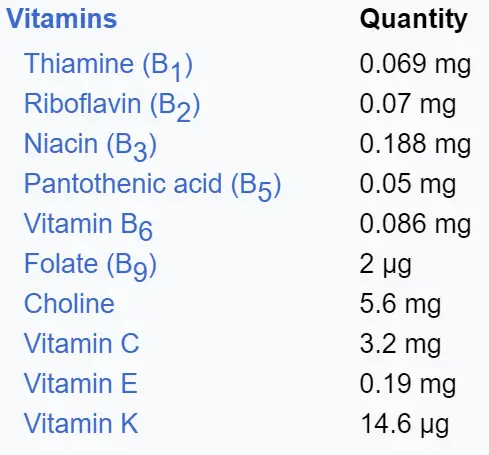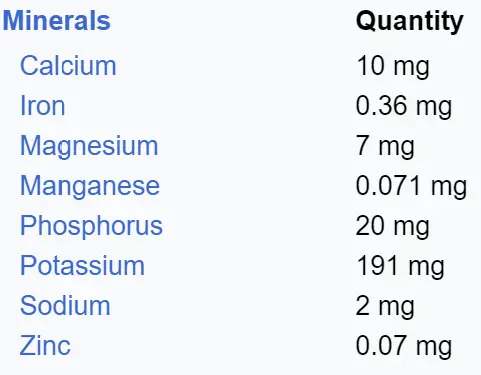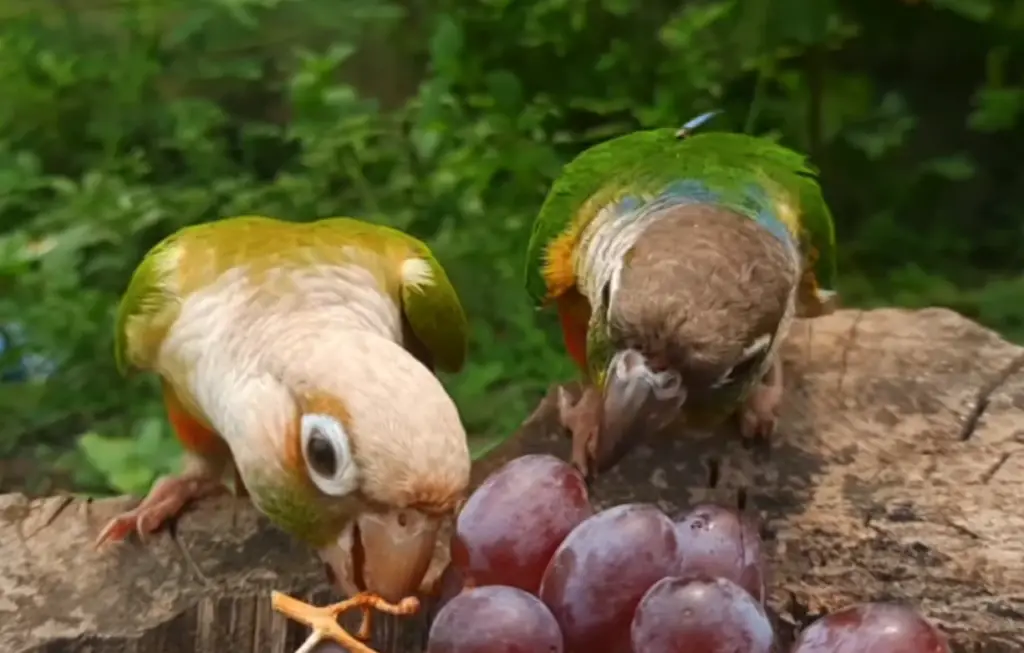Can Conures Eat Grapes?
Got a curious conure peeking at your lunch? Spotting those juicy grapes and wondering, “Can my feathered friend safely share a nibble?” You’re not alone! Many bird enthusiasts ask the same question. So, can these bright-eyed buddies actually enjoy the grapevine? Let’s peel back the layers (pun intended) and discover the sweet and tangy truth.
Related post-
Grapes and Bird Nutrition: A Burst of Rainbow Vitamins

Imagine your conure perched on a miniature fruit stand, surrounded by the colorful bounty of nature. Grapes aren’t just juicy treats; they’re tiny treasure chests packed with nutrients to keep your feathered friend vibrant and healthy. Let’s peek inside and discover the rainbow within:
- Vitamin C: Imagine a tiny superhero cape shielding your conure from sniffles and sneezes! This powerful vitamin boosts their immune system, keeping them chirping through any weather.
- Vitamin K: Picture your conure zooming around their cage, fueled by this vital vitamin. Vitamin K helps their blood clot properly, ensuring their active adventures are safe and fun.
- Potassium: Think of it as rocket fuel for tiny engines! Potassium fuels your conure’s playful antics and energetic chirps, keeping them bouncing with joy.
- Antioxidants: These are like magic shields protecting your conure’s cells from invisible foes. Antioxidants like lycopene help keep them healthy and happy for years to come.

But remember, even the brightest rainbows have a few stormy clouds. Grapes also contain:
- Sugar: Imagine tiny tornadoes whirling in your conure’s tummy! The natural sugars in grapes can be exciting in small doses, but too much can lead to digestive upset and energy crashes. Moderation is key!
- Skin and seeds: These parts are like hidden traps in the juicy flesh. They can be choking hazards and cause blockages if swallowed whole, so careful preparation is essential.
- Pesticides: Like many fruits, grapes can harbor tiny pesticide residues. Thorough washing minimizes this risk, so think of it as a detective mission to ensure your conure’s treat is squeaky clean!
By understanding the rainbow of nutrients and hidden clouds within grapes, you can safely share this delicious treat with your feathered friend. Moderation, careful preparation, and a watchful eye are the keys to making grape-tastic memories in your feathered kingdom!
Can Conures Eat Grapes? The Answer with a Tiny Stem!
So, can your vibrant conure join you in a grape-tastic feast? The answer isn’t black and white, but it’s definitely not a resounding “no” either! While not inherently toxic, grapes require extra care due to their hidden quirks. Let’s weave a web of knowledge to ensure your feathered friend enjoys the sweet side of grapes safely:
Tiny Treats, Not Whole Bunches: Imagine miniature grape slices, no bigger than blueberries. Keep it bite-sized to avoid choking hazards and digestive overload.
Ripe is Right: Ditch unripe grapes, as they’re more acidic and contain higher sugar levels. Opt for perfectly ripe ones, like plump little jewels bursting with sweetness and nutrients.
Seedless Surgery: These tiny troublemakers can cause blockages. So, picture yourself as a bird whisperer, gently removing the seeds before offering the treat.

Skin It Down: The skin can pose choking hazards, so imagine peeling away a tiny grape cloak to reveal the safe and delicious flesh underneath.
Moderation Mantra: A tiny nibble once or twice a week is plenty of grape-tastic excitement. Remember, a balanced diet of pellets and leafy greens is still the main course!
Watchful Chirps: After their grape adventure, observe your conure for any signs of tummy troubles, like changes in droppings or decreased activity. If anything seems off, consult your avian vet for guidance.
Remember, happy tummies lead to happy chirps! By following these tips, you can share the joy of a juicy grape with your feathered friend, adding a dash of sweetness and variety to their dietary lives. Just keep it tiny, ripe, seedless, and occasional, and you’ll be singing the joyful melody of responsible bird-parenting in no time!
Safe Grape Adventures: Your Guide to Tiny Treats
Ready to embark on a grape-tastic journey with your feathered friend? Here’s your treasure map to navigating the world of safe and delicious grape treats, ensuring happy chirps and healthy tummies:
Preparing the Perfect Bite:
- Wash and dry thoroughly: Imagine a detective mission to remove any pesticide residues! Rinse the grapes under cool running water, gently rubbing them with your fingers. Dry them completely with a clean paper towel to avoid excess moisture.
- Slice into tiny jewels: Picture yourself as a miniature chef, carefully cutting the grapes into bite-sized pieces, no bigger than blueberries. This prevents choking hazards and ensures easy digestion.
- Perform seedless surgery: Gently remove any seeds using a small knife or your fingers. Imagine these seeds as tiny troublemakers that could cause digestive blockages, so take your time to ensure a safe and seedless treat.
- Peel away the skin: While some conures might enjoy the skin’s texture, it’s generally best to remove it to minimize choking risks and potential pesticide exposure. Peel it back like a tiny grape cloak, revealing the juicy, safe goodness underneath.
Offering the Treat:
- Present the tiny treasures: Place the prepared grape pieces in a clean bowl or directly into your conure’s food dish. Watch their eyes light up with curiosity and excitement as they discover the colorful treat!
- Observe and monitor: Keep a watchful eye on your conure as they enjoy their grape adventure. Ensure they’re chewing the pieces thoroughly and not gulping them down whole. Look for any signs of choking, discomfort, or unusual behavior.
- Remove any uneaten pieces: After a reasonable time, remove any leftover grape pieces to prevent spoilage and potential overindulgence.
Alternative Delights
Remember, grapes aren’t the only way to add sweetness and variety to your conure’s diet! Explore a rainbow of other bird-safe fruits and vegetables to keep their taste buds entertained and their bodies nourished:
- Berries: Strawberries, blueberries, raspberries, and blackberries are all excellent choices, packed with vitamins, antioxidants, and juicy flavors.
- Apples: Offer them sliced or grated, removing seeds and cores.
- Bananas: A soft and sweet treat, perfect for sharing small pieces.
- Mangoes: Diced mangoes offer a tropical twist, rich in vitamins and antioxidants.
- Peaches: Remove the pit and slice into manageable pieces.
- Broccoli: A crunchy and nutrient-rich veggie that many conures find irresistible.
- Carrots: Grated or sliced carrots provide a beta-carotene boost.
- Kale: A leafy green powerhouse of nutrition for your feathered friend.
Remember: Variety is the spice of life, and the key to a balanced diet for your conure! By offering a colorful array of fruits, vegetables, pellets, and leafy greens, you’ll ensure they receive all the nutrients they need to thrive and chirp happily ever after.
Important Reminders for Grape-Wise Conure Parents
Before you embark on your next grape-tastic adventure, let’s review some crucial tips to keep your feathered friend safe and sound:
Veterinarian Advice: Your Golden Feather
- Your avian vet is the true expert on your conure’s individual needs. Always consult them before introducing any new food, including grapes, to ensure it aligns with their health and dietary requirements.
- If your conure has any underlying health conditions or sensitivities, your vet can provide tailored advice on safe and appropriate treats.
- Don’t hesitate to reach out to your vet if you have any questions or concerns about grape-feeding or your conure’s diet in general. Their guidance is invaluable!
Toxic No-Go Zones
- While grapes themselves can be occasional treats, grape leaves and stems are a strict no-no for conures. These parts contain toxic substances that can cause serious health issues, including kidney failure.
- Always keep grape leaves and stems far away from your curious feathered friend. Consider them like tiny grape villains, never to be invited to the party!
Cooked Grapes: A Jam-Packed Issue
- Grapes that have been cooked, processed, or seasoned are generally not suitable for conures. This includes jams, jellies, juices, and grape-based desserts.
- The cooking process can alter the nutritional content of grapes, making them less beneficial and potentially more harmful due to added sugars or preservatives.
- Stick to fresh, ripe, raw grapes for a safe and healthy treat that your conure can truly savor.
Remember: Knowledge is your superpower when it comes to feeding your conure! By understanding the nuances of grapes and following these guidelines, you can confidently share the occasional grape treat while prioritizing their overall health and well-being. Happy chirps and grape-tastic adventures await!
Conclusion: Sweet Grapes, Happy Chirps, and Responsible Guardians
So, can conures have grapes? The answer, like the fruit itself, is full of layers. While these juicy treats offer a burst of vitamins and antioxidants, they also come with hidden seeds, sugars, and potential risks. But fear not, responsible conure guardians! By embracing moderation, safe preparation, and a watchful eye, you can navigate the world of grape-tastic delights with confidence.
Remember:
- Tiny treats, not whole bunches: Keep it bite-sized and seedless, prioritizing a balanced diet of pellets and leafy greens.
- Moderation is key: A nibble once or twice a week is plenty of sweet excitement.
- Safety first: Wash thoroughly, remove seeds and skin, and monitor your feathered friend for any signs of discomfort.
- Veterinarian advice is gold: Consult your avian vet before introducing any new food, including grapes.
- Toxic parts are off-limits: Keep grape leaves and stems far away, and stick to fresh, raw grapes for safe treats.
By following these steps, you can transform grape-loving moments into joyful memories of shared flavor, trust, and responsible bird-parenting. After all, happy chirps, healthy tummies, and a dash of sweet variety are the true recipe for a thriving feathered friend. So, go forth, explore the world of grapes responsibly, and watch your conure’s face light up with the delight of a tiny, safe, and delicious treat!
Remember, you are not just a bird owner; you are a bird whisperer, a detective of hidden sugars, and a chef of tiny grape treasures. Embrace your role, share the sweet responsibility, and enjoy the beautiful melody of happy chirps that are a testament to your love and care. May your adventures with grapes be full of wonder, safety, and the joy of witnessing a feathered friend discover the world, one tiny bite at a time!